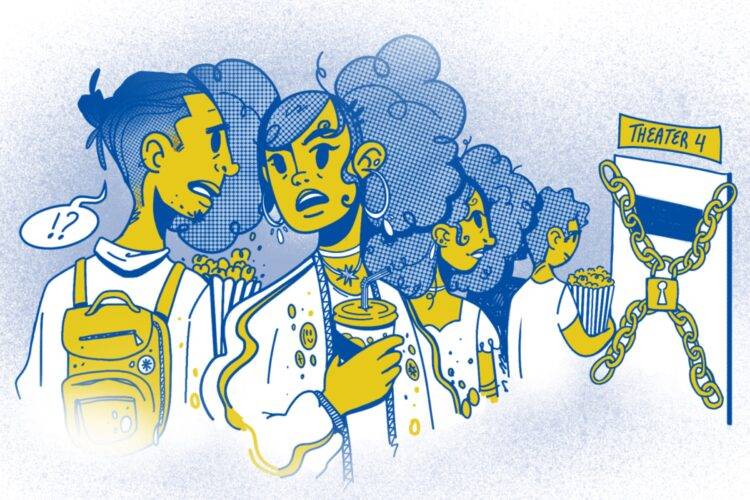
Cinema made by and geared towards Black audiences has faced ups and downs forever — from navigating eras like Blaxploitation in the 1970s to today’s rise in the Black horror trend. But more often than not, independent Black films have slipped through the cracks, never to be seen by wide audiences. Meanwhile the Hollywood mainstream favors white productions, only providing a handful of Black lead films per year — and those are often focused on the trauma porn of Black life.
Not so with “Naked Acts,” a 1996 film by Bridgette M. Davis follows a young Black woman named Cicely as she navigates her identity after losing 57 pounds and becoming an actress. She gets a role in an art film, but upon learning her character requires a nude scene, she is forced to address unresolved trauma from sexual abuse.
There is an assumption that all Black films are only about trauma — a reductive idea that Davis explains thoroughly in her 2024 panel discussion at the Gene Siskel Film Center. A concept focused on in her film is caretaking.
“Black grief and Black joy are coexisting all the time in our life,” said Davis.
It was important to Davis when developing Cicely’s character that she be cared for in her time of pain. Cicely is enveloped in support and sisterhood as she begins healing. Davis brings nuance to a deep conversation about sexual abuse in “Naked Acts,” ensuring that acts of violence aren’t shown on screen, opting instead for scenes of overwhelming compassion that include comedy and a reflection of modern Black life at the time.
After the film’s debut in 1998, which drew lines around the block, “Naked Acts” was archived in the Black Film Center Archives at Indiana University and was not distributed further. For 20 years, the movie could only be seen at the Black Film Center Archives in its 35mm original format.
In 2014, it was shown at a discussion at the University titled “NAKED ACTS: Image Making and Black Female Sexuality,” to celebrate 20 years of the film. In a press release, chief archivist Brian Grainey called the film “an expressly Black feminist project: to explore the myriad influences — personal, familial, communal, and societal — that have an impact on [a Black woman’s] sense of herself.”
When “Naked Acts” was rediscovered by Black female archivist and restorer, Maya Cade, she was overwhelmed with the desire to restore the film and distribute it. Cade brought the film to the Gene Siskel Film Center in Chicago to be shown as a part of the 2024 Black Harvest Film Festival, curated by Jada Amina.
“Naked Acts,” in its restored 4K quality, appeared on the big screen in Oct. 2024 to a large audience for the first time since its discussion at Indiana University, marking 30 years since its production. With the screening, a moderated discussion with Davis and Cade was facilitated with an extended Q&A.
While discussion focused heavily on the concepts in the film, it was repeatedly acknowledged how quickly independent Black films like “Naked Acts” are archived, forgotten, and/or never distributed. Many indie films are brought to festivals with the hopes of walking away with a deal for distribution. But when Black films are brought to festival screens, despite positive receptions and endearing storylines, filmmakers are often told that their movies simply won’t sell.
Producer and director Darius Clark Monroe shared with The Wrap in 2018 that after screening his award-winning film “Evolution of a Criminal” at multiple festivals in 2014, he was told by buyers that his movie — chronicling his life utilizing an all Black cast — wouldn’t find an audience.
According to research conducted in 2021 by McKinsey & Company, films with Black leads are 30 percent less distributed than other films, despite achieving equal box office sales as movies with white leads. The study also found that Black distributors make up a small fraction of film distributors, with the percentage of Black professionals working key off-screen roles at only 6 percent.
In 2013, staff at the digital media company Blavity wrote a post arguing that the problem isn’t distribution, but production itself.
“Before we worry about the lack of distribution, shouldn’t we first ensure that the films are actually being produced?” the Blavity article asks. Despite demand for Black-led and produced films being at its highest, the same McKinsey research article addresses that films produced and directed by Black artists are 40 percent less funded than other productions.
There are many stories like “Naked Acts” that share diverse perspectives and walk audiences through complex experiences of joy and despair around Black life — films that are produced by and for Black people. Far too often, these independent Black films become inaccessible moments after their conception — sometimes even at their initial idea when met with funding constraints.
Why are Black-led films not allotted more space in Hollywood? How can we begin to tear down systemic barriers and bring more Black films into distribution? Audiences crave Black cinema, they deserve more then two to four Black films per year that make their way into theaters and homes. “Naked Acts” has filled auditorium seats three times and crafted powerful dialogue amongst viewers. When will Black films be enjoyed rather than archived and forgotten?
You can support Black films all month long with the Gene Siskel’s Black Harvest Film Festival running from Nov. 8 to 21.







